Introit, Lent 1
-
this post was a headache but the pay off is being able to compare many options for the entrance antiphon. copying and pasting some here:
From the Gregorian Missal: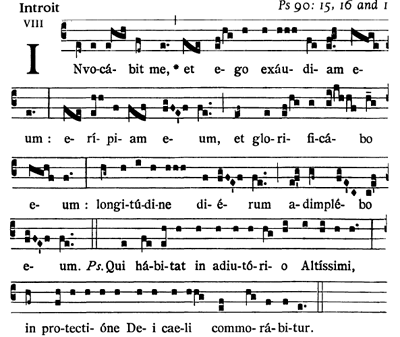
From Fr. Samuel Weber:
From the American Gradual:
From the Complete English Propers (Abrogast):
From Fr. Columba Kelly: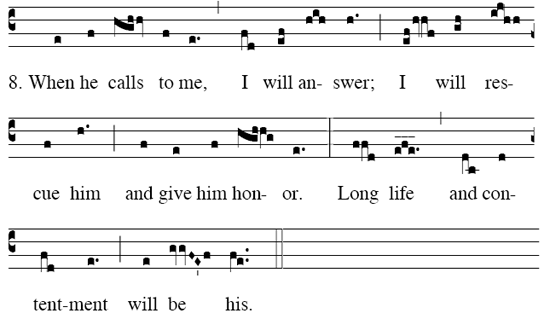
From the Anglican Use Gradual: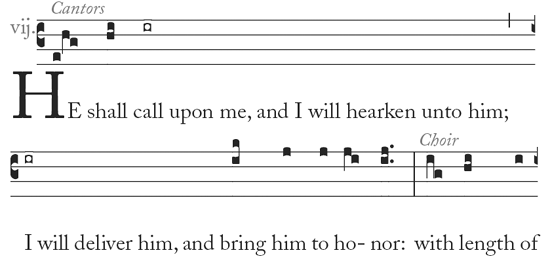
If nothing else, there are always the Rossini propers:
Even given all of this--and everything here is completely free--I've probably left some possibilities out here. -
We are singing the first option that Sunday. Lovely chant.
-
How nice it would be to have all these choices in one book - if it wouldn't be necessarily bulky. I think the best are the Graduale Romanum, Ford's American Gradual, Kelley's settings, and the Anglican Use Gradual. The others seem less inspired. lacking in artistry. I would be interested to know the opinions of others. Kelley's original work is particularly clean yet graceful - proof that any choir can master a real chant tune for the propers; and in quite readable square notes, yet. If this is an obstacle to anyone I could only wonder on what planet she has been living. All of Fr Columba's work is exquisite, superb.
-
Thanks for the above, especially the Complete English Propers. I have been looking for the entrance for the 5th Sunday of Lent and had only found an Antiochian Orthodox chant I could possibly use. My church is having confirmation that day, and I want the choir to sing the entrance as the bishop processes, rather than play a processional as has been the custom in the past. While singers are fine with the square notes, I find that trying to accompany them and conduct from the organ is more than I can handle. I generally need either accompaniment or a single melody line written in modern notation. So I go into Finale and re-write the square notes for myself. It's good that you present some options not requiring that. Weber hasn't published the music for the 5th Sunday at this time.
-
Jeffrey, I was planning to spend an entire morning pulling these out and choosing one--and now all I have to do is choose and paste.
Thank you! -
My parish choir will sing the Rossini propers. For the convenience of
cantors, the propers of the 1st Sunday in Lent were cut and pasted in one sheet.
-
I would have used the Rice simple choral gradual but I don't think it goes up to Lent yet.
hint hint hint -
I like Fr. Columba Kelly's. I could suggest my MD we can start singing Propers by choirs (maybe even the contemporary group can sing propers) before we sing hymns. (I'm editing here to specify: after the gathering hymn for Introit)
I'm wodering about that one 'ictus' (since we just had a thread on ictus, it's all in my head.) on 'be' at the end in his Introit. It helps grouping of ternary and binary, I believe that's why it's there. (Although it's not like an accent, and should never be, it feels different when you group the neum differently.)
I wonder ictus markings have the similar effects in singing Engish chants as in latin. It's interesting to find out. I guess I'll find the thread on his chants and ask. -
I think I missed something. Will some kind person tell me where Richard Rice's simple choral gradual is to be found?
thanks. -
check out this topic: http://musicasacra.com/forum/comments.php?DiscussionID=1212&page=1#Item_18
Richard's two files of the gradual that he has so far can be downloaded from that topic... -
This is a wonderful posting. We will sing the Gregorian Introit (OF Mass). Now if we had the same options for the Tract ; }
Hint. Hint. -
We're enjoying bridging between using Bruce Ford's Amer.Grad. and the GS quite well out here in CA. We have had a number of folks (from diverse demographics) go out of their way to remark about how beautiful the AG chants have proved to them, both in terms of "solemnity" and from their remniscenses of eras past. Thanks for the link to the Kelley; not been able to bring it up until now, and I agree about the readability of the neumes based upon the above excerpt.
-
I had a weird experience in posting these. For the first time, I realized that I can read music in neumes more quickly than modern notes. The melody in nuemes jumps out at me, and I hear it immediately. Modern notes I find myself looking at key signatures and finding half steps and things, testing and checking pitches. I never thought that day would come.
-
GREAT POST !!!
What about the NOH Introit for this Sunday?
Can that be added? The entire NOH is free here
:-) -
isn't the NOH just accompaniment to the Greg?
-
No one has really commented on the joy found in the Introit for the first week of Lent. Not what one would necessarily expect. Here's my personal critique of the bunch:
(great idea, Jeff, to post them side by side by side...)
Next to the Gregorian, which should always be one's first choice for the Roman Church, I think Abrogast works best. The Ford, the Weber, even the Kelly are all clearly applying a music to a language which is on its own not florid, one more deftly done than the other. But English is syllabic in nature, and that is part of the beauty of its rhythm. I won't say much about the Rossini because there is not much to say. boring.
The Abrogast antiphon has a melody of its own that works beautifully and was composed for the English text. It is therefore my favorite of the English options, and after one glance at all options. You will still sing a psalm tone along with it for the psalm. But I like the idea of preserving the idea of an antiphon which is separate from the rest.
The Anglican Use works, but again, everything is sung to a psalm tone. Can be wonderful in its repetition and familiarity from week to week, but can also be boring for the same reasons -
Yes, what does that sense of joy in that Lenten Introit suggest?
-
If I were faced with this decision I would go with Fr. Kelly's adaptation (if I were working with a choir familiar with Gregorian). I confess, though, that I would modify it slightly to have the melody fit the language a bit better (at least as I hear it). The image below highlights my modifications:
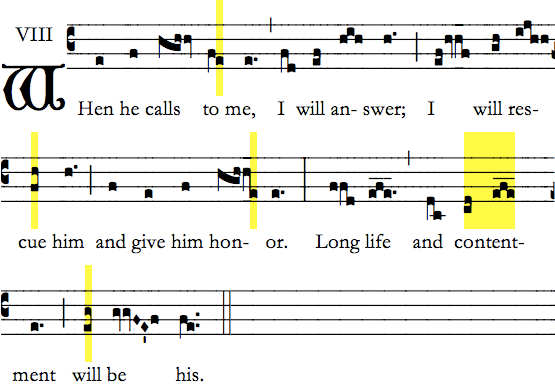
Competing for second would be the Arbogast and the Ford (though I would terminate the Arbogast with a G-F to move it closer to the Tone 8 of the original Gregorian.) -
It is just an accompaniment, but uses the "pure Vaticana" rhythm. I thought some would like to compare the accompaniment to Jerome Weber's above.
-
Here is Johner on this chant
We have now entered the serious season of Lent, the season of penance.
Much is expected of us during this time. But the prospect should
not dismay us; sadness or weariness are entirely out of place. For we are
not to carry on the fight alone. Now more than ever the Lord will be
our help. We may call upon Him, and He promises to hear us (first
phrase). He will remove all obstacles, all ground for complaint; He will
"deliver us;" He will even—Oh, the wonder of it!—glorify us (second
phrase). And that which He now promises us is, moreover, to be our
lasting possession, is to fill the yearning of our hearts for all eternity
(third phrase)
The words of the Introit found their fulfillment in the Saviour Himself.
His long and fervent prayer was answered by reason of the piety
with which He prayed. He was freed from all pain and from all His
enemies; He was glorified, and both the fullness of days and the fullness
of joy overflowed into His sacred humanity. That is the wonderful panorama
which Mother Church unfolds for us on this very first Sunday in
Lent.
We must also pray this Introit as if it were coming from the hearts
of the catechumens. The station today is at St. John Lateran, the mother-
church of all Christendom, dedicated to St. John the Baptist.
There, on the night preceding Easter, the catechumens will find the
dearest wish of their heart granted; there the Sacrament of Baptism will
remove from them the power of their enemies and free them from the
vicious world and from the darkness of sin. There they will be received
into the Communion of Saints, obtaining thereby a claim to the glory
of heaven.
These thoughts are of themselves sufficient to prevent us from giving
a somber interpretation to the present Introit. The fact that it belongs
here, to the first Lenten Sunday, will not hinder us from singing
it as a joyous, sunny song, transfigured by the goodness of God.
The first phrase twice touches the note /, but only in passing; in the
main it restricts itself to the tetrachord g-c. The word-accents are well
defined and usually occur on the dominant c. The second phrase is built
around the magnificent glorificdbo, which truly sings of glory. Its closing
word is like the first eum, but a bit more restricted. Glo-(ria) is like
e-(go) of the first phrase, and eripiam resembles invocdbit. The third phrase
begins on the dominant, and assigns to dierum and eum the same notation
that eum of the second phrase has. Adimplebo is the counterpart
of glorificdbo: the former has e as its lowest note, the latter has e as its
highest. All the depths of the soul, be they ever so profound, will find
their perfect satisfaction in the glory of God. Although this phrase is
much like the preceding one, the emphasis given to d in the first half
and the descent to e in the second half succeed in individualizing it.
Parallel sentence structure, clear delineation and presentation of what is
important, pleasing contrasts and cadences: those are the features of
this chant. -
This is beautiful. The more you study, the more you are amazed how deep it is. Thanks for posting it.
-
Re: Jeffrey T's comment about neums:
Yes! It's amazing. You no longer even think of the pitches on the modern 5-line staff. I'm trying to persuade my schola of this very point.
Can you say paradigm shift? -
Janet G:
thanks very much for the link. -
Aristotle,
I think your clef is a line too high; I was singing through thinking, "Gosh, this doesn't sound like Mode VIII." : ) -
Oops!
Thanks, Heath; corrected now. -
AOZ wrote: "...even the Kelly are all clearly applying a music to a language which is on its own not florid."
In what sense is English "not florid." Although Latin words tend to be longer than English words, Latin prose is more compressed than English prose. Compare that Latin collects with Cranmer's translations of them. To express the same ideas in English prose Cranmer required many more words. Psalm verses seem to be of about the same average length.
Certain characteristics of English present challenges to the chant adapter, of course. These have often been identified: frequent oxytonic phrases, comparatively more frequent incidence of proximate accented syllables, and a good number of unstressed syllables lacking true vowel sounds. Only the last of these three is sometimes insurmountable. Literal transcription is, of course, doomed to failure because the "architecture" of most chants is related to verbal accentuation. The successful adapter must take the composition apart and put it back together again, as it were. -
Bruce
Yes, you must take it apart and put it back together again. But sometimes I wonder about the whole enterprise of the chant adapter. Why do we do it? To preserve the the Gregorian sensibilities? Yes, that is one reason. To try preserve an idiom and a tradition and a music that would otherwise be lost from the Mass forever? Yes.
But I wonder if there isn't something even more we can learn from the Gregorian tradition - the beauty of its form, and its perfect meld of text with melody. I don't honestly believe that the best product can be rendered from taking an extant melody, pulling it apart, and reconstructing it for English. In its origin these melodies belong to the Latin. A chant adapter with a thorough understanding of the modes, someone who has internalized the sensibilities of the chant, yet also has a full grasp of the vernacular and a sense of poetry in music - might think about applying these lessons of beauty and form to a brand new composition. That's really much more of an organic process.
I face these kinds of questions on a daily basis in another capacity - as a translator. -
I just want to say thanks, again! I was able to finish planning all of Lent this week, and couldn't have done it without this post!
-
AOZ wrote: "But I wonder if there isn't something even more we can learn from the Gregorian tradition - the beauty of its form, and its perfect meld of text with melody. I don't honestly believe that the best product can be rendered from taking an extant melody, pulling it apart, and reconstructing it for English."
My reply: Much, perhaps most, of the Latin chant repertory is the product of just such adaptation. The vast majority of the office antiphons are centos. The tracts and at least half the Graduals and Alleluias are type melodies. Even a number of the so-called "original through-composed" pieces are adaptations. Consider, for example, the offertory, "Iustorum animae," which is an adaptation of "Stetit angelus," which is itself derived from "Viri Galilaei." The introit for December 8, "Gaudens gaudebo" is a twentieth-century adaptation (by Joseph Pothier) of "Vocem iucunditatis."
Where type melodies and centos are concerned, we cannot even speak of an "original." Where an "original" has been adapted to a different Latin text, the "copy" is often superior to the model.
The techniques used by the medieval adapters can be employed with English texts--sometimes with equally satisfactory results. Sometimes a "perfect meld of text and melody" can be achieved in a vernacular adaptation that is lacking in the source. Compare Winfred Douglas's adaptation of Agnus Dei IX with the Latin version, and you'll see what I mean. I can even think of cases where more felicitous "word painting" is achieved in the adaptation than in the source. Compare "levavi" in the introit for Advent 1 with "lift" in the American Gradual transcription.
+++
AOZ wrote: "But sometimes I wonder about the whole enterprise of the chant adapter."
At least where the propers are concerned, the Latin chant is designed to help singers and listeners to meditate upon a scriptural text. When the chant is sung in Latin, it can serve this function only for those who understand Latin and understand it almost effortlessly. A printed translation can tell others what words are being sung, but the chant cannot "clothe the text" for them. What they experience is quite different from what the skilled Latinist experiences. Latin chant may create for them acertain ambience conducive to meditation, but it cannot do what it is intended to do. Successful adaptations to vernacular texts can.
I think that the chant adapter's undertaking is definitely worthwhile.
Where the ordinary is concerned, people in the pews may become sufficiently familiar with the texts that Latin poses no problem. Unfortunately, the people in most congregations have not. Getting them to sing the ordinary in Latin MAY be a laudable goal; but it certainly not yet been attained. It was rarely attained before Vatican II, even though the Vatican authorities, from Pius X onward, had urged that it be pursued. -
I'm not arguing here for either Latin or English and which is more readily understood or appreciated by the pips, not to mention the Latin scholars among us. I'm just making a point about the music itself in relation to any language, and vice versa. I hesitate to say language it clothes, because the text and the musical line exist symbiotically in my eyes.
-
"At least where the propers are concerned, the Latin chant is designed to help singers and listeners to meditate upon a scriptural text. When the chant is sung in Latin, it can serve this function only for those who understand Latin and understand it almost effortlessly. A printed translation can tell others what words are being sung, but the chant cannot "clothe the text" for them. What they experience is quite different from what the skilled Latinist experiences. Latin chant may create for them acertain ambience conducive to meditation, but it cannot do what it is intended to do."
Which gets us back to Jeffrey's me-centered liturgy. Very Protestant... -
I can't never forget singing Beethoven's 9th in German when I was in a college choir. I didn't understand every word, but I don't think I can get the same feeing if I sing that in English. (somehow cannot imagine that singing it in French?) No wonder many choirs try to sing choral works in the original language, and singers try to learn many different languages. But if you are not able to do that well, I guess you have to do it in your language. I appreciate the effort of trying to preserve the Gregorian melody and make it accessible to many people, which we probably need,but it is evitable that certain nuances of latin and it's melody together can only create will be lost. But I think good composers can make gregorian melody sounds beautiful in different languages too, although the melody has to be modified to a certain extent .
-
Richard, I don't think that the mind's elevation by the meaning of the words of the sung text is me-centered. It's liturgical prayer.
-
My attachment to Latin is sentimental, and I want to keep the great music written in it alive. I frequently hear that chant can not be adapted to English, and that somehow the two don't go together. The Anglicans figured all that out centuries ago and have done an excellent job of advancing chant in English. As a Byzantine, we have some of the same issues with those who want to use Old Church Slavonic as opposed to English. In practice, some of our churches have settled the issue by using both at different times. From the time of Sts. Cyril and Methodius who translated the Greek into Slavonic, the Eastern approach has generally been that liturgy should be in the language of the people. For myself, I have reached the conclusion that it is possible to have chant and good liturgical music in any language. My own approach is to keep the best music of the past, and use the best that is being created today. That seems to me a good example of "organic development."
-
In a small TLM setting, like in my parish, without competent cantors who can sing the Graduale Romanum, the Rossini propers have been the only alternative. I hope our situation can improve with the Colloquium this year. Thank you all the hard workers in the CMAA. This website is great!
-
I think you have illustrated why the Rossini propers were so popular in the first place. it's a myth that Catholic music was glorious before Vatican II. It may have been wonderful somewhere, but I remember some of also being pretty bad. In some places, it wasn't a matter of it being bad, but that singing the Graduale was beyond the resources of the local churches.
-
In my humble opinion, the Rossini propers did not sound that bad. When I first heard the Rossini propers, I was so moved and almost cried. Maybe my ears were not as much trained as professional musicians. By the way, I am not a director, but a choir member who just started to have great interest in Church Music.
-
I think Psalm tones can be very nice and very dignified, much more than emotional broadway songs or rock music.
That being said, I hope that this site will help many people learn the Propers. -
I've often wondered about the context in which Rossini was introduced. It's not as if people were singing the Graduale and then the R props came and people said, great, now we don't have to do the hard stuff; we can take the easy way! At least, I doubt that this was the case. It must have been that the propers weren't be sung at all. I have no idea really but it seems likely that Rossini might have been an improvement in many parishes.
-
Well, as someone who is learning 3 of the Lent I Tract verses, I can sympathize with church musicians pre Vat2 who were not highly trained and still tried their best. This chant is a tough one and long (11 minutes). If it doesn't fly at rehearsal tonight, I'm breaking out my copy of Rossini!
-
-
That is a good one. It is not as florid as Graduale Romanum and not as monotonous as the Rossini. I think we can try that tomorrow during choir practice. Thank you, Prof. Tucker!
-
About Rossini vs. GR, I have found the 'Chants Abreges' to be an incredibly promising step. It irritates me that there is no melodic distinction at all between the Graduale and Alleluia or Tract with Rossini, so I'm really looking forward to trying the Chants Abreges, men on Graduale and women on Tract or vice versa this week.
We regularly use the Introit from the GR, and have just started getting more regular with the Communio. By this time next year...
Also, the above exchange [AOZ, Bruce, Kathy] and about sung prayer and language is interesting and points to a debate well worth having. With respect, Kathy, I would agree that desiring Propers in the vernacular (at least all or most of the time) is me-centered. In practice it would mean eclipsing tradition for expediency, even expediency with some value. Too much would be lost. -
It seems the Tracts from Chants Abregés are set to pure psalm tones, aren't they? Perhaps that makes them sound more penitential than the Alleluias.
A little off-topic: the Graduals from Chants Abregés seem to me good sources of slightly modified psalm tones, or at least a source of inspiration to compose them. -
Thanks Jeffery, but we are going to give the Gregorian Tract a go. We've been working on it. The verses will be sung by a trio of cantors for security's sake. We discovered at the run through last night, though, that the offertory and communion need some work at our final Saturday afternoon rehearsal. This Mass has really pushed us!
-
Well, great! here is a mini version that you can clip (just teasing)
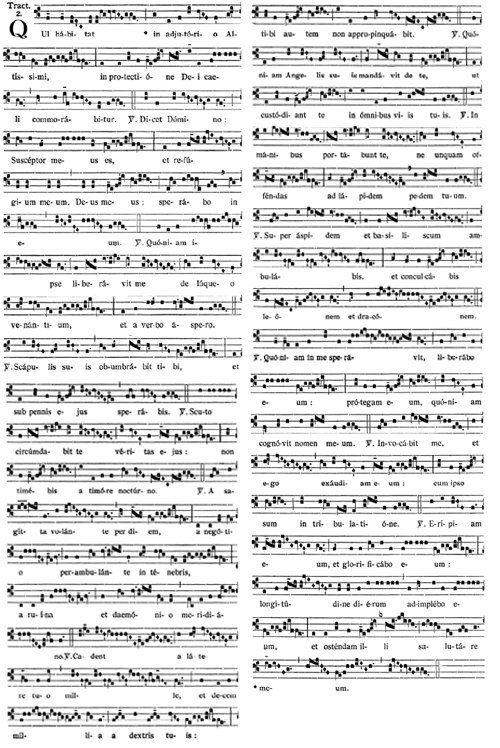
-
I had written: ""At least where the propers are concerned, the Latin chant is designed to help singers and listeners to meditate upon a scriptural text..."
Richard R. reponded: "Which gets us back to Jeffrey's me-centered liturgy. Very Protestant-- "
In reacting against the prevailing tendency to over-emphasize the didactic and sactifying functions of liturgy at the expense of the latreutic, we must resist the temptation to ignore these functions altogether. The right relationship between the two is well summarized in the following preface for weekdays (from the Missale Romanum):
"Very dignum...Quia, cum nostra laude non egeas, tuum tamen est donum quod tibi grates rependamus, nam te non augent nostra praeconia, sed nobis proficiunt ad salutem, per Christum Dominum nostrum..."
FREE TRANSLATION: For you have no need of our praise, but by your grace we are enabled to praise you, not so that our praises may increase your glory, but that they may avail for our salvation; through Christ our Lord.
LITERAL TRANSLATION: Because, while you do not operate on our praise, it is your gift, nevertheless, that we may give you thanks, not so that our praises may increase you, but that they may avail for us toward salvation, through Christ our Lord.
Furthermore, in seeking to draw attention to the supra-rational element in worship, we must resist the temptation to ignore the rational.
St. Paul wrote, "I will pray with the spirit, and I will pray with the understanding also: I will sing with the spirit, and I will sing with the understanding also." -
St. Paul wrote, "I will pray with the spirit, and I will pray with the understanding also."
Bruce, I know you appreciate latin propers too, but the above quote of St. Paul can mislead many. Because praying and singing in vernacular doesn't automatically lead to the correct understanding of the Scripture. (oftentimes it can be more dangerous, because people can take it in their own 'vernacular thinking' more easily.)
When I hear the propers in latin, I get the sense of awe and authourity more, because it's the Church's language and not everyday language I use for my kids. I do not understand everything, but make me desire to understand more and take it more carefully.(like I don't understand everything about God, but I try to understand more.) Also latin is so beautiful to sing and listen with pure vowels and all. This attracts me to listen more. Well, that' just my personal experience.
Welcome to the MusicaSacra Forum!
To participate in the discussions on Catholic church music, sign in or register as a forum member, The forum is a project of the Church Music Association of America.
Categories
- All Discussions21,274
- General Music Discussion8,296
- Job Openings214
- Management of Music Programs852
- Choral Matters534
- Church Documents and Rubrics528
- CMAA Notes304
- Events730
- For Newcomers: Read First26
- Sacred Polyphony548
- Hymnody875
- Gregorian Chant: General2,709
- ↳ Graduale Romanum and Liber Usualis369
- ↳ Graduale Simplex60
- ↳ Semiology63
- Vernacular Plainsong697
- Anglican Use and Anglican Chant68
- Organ, Other Instruments and Repertoire438
- New Composition/Works in Progress1,302
- Recordings234
- Music for Hispanic Ministry162
- Music Education: Children213
- Music Education: General222
- News Items245
- Positions Wanted3
- General Discussion: Catholicism740
- Amusements178
- General Discussion1,037
- Opinions119





